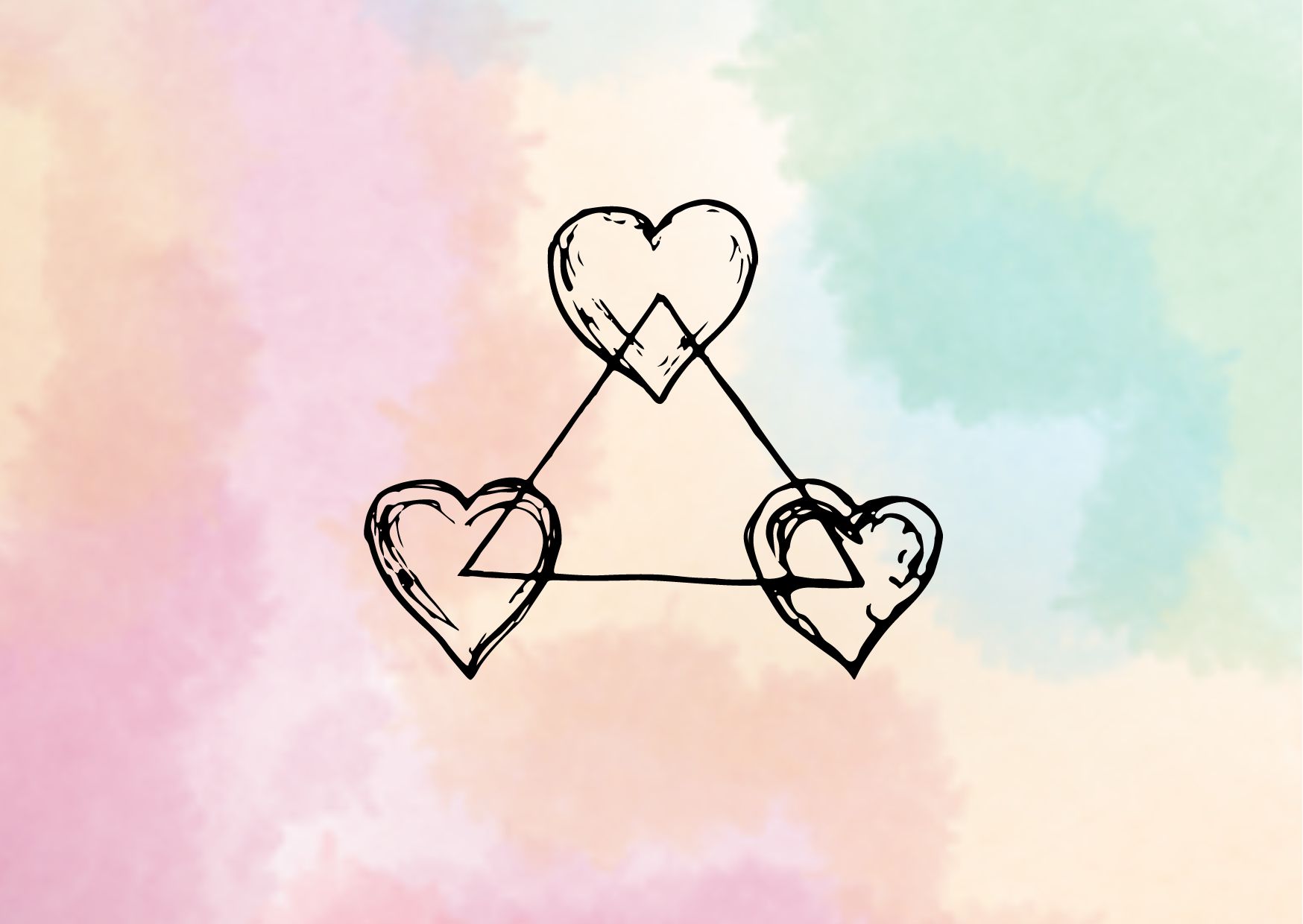Navigating the Complexities of a Love Triangle: A Comprehensive Guide
A love triangle, an intricate romantic entanglement involving three individuals, has long captivated audiences across various storytelling mediums. This narrative device, where two people harbor feelings for the same person, fuels emotional turmoil, complex dynamics, and compelling character arcs. From Shakespearean tragedies to modern television dramas like “Scandal,” love triangles have endured as a potent plot device, challenging protagonists with profound choices that shape their journeys.
In this comprehensive guide, we delve into the nuances of love triangles, exploring their emotional impact, ethical considerations, and strategies for navigating these intricate relationships. Whether grappling with the challenges of a bizarre love triangle, examining famous examples, or understanding the different types, this article offers insights into untangling the complexities of these romantic conundrums, ultimately providing a roadmap for those caught in the throes of a love triangle relationship.
Understanding a Love Triangle
A love triangle is an intricate romantic scenario involving three individuals, where one person is romantically involved with or pursued by two others simultaneously. This complex dynamic often leads to a web of conflicting emotions, jealousy, and potential heartbreak. To truly grasp the nuances of a love triangle, it’s essential to recognize the various types and underlying factors that contribute to its formation.
Types of Love Triangles
- Rivalrous Triangle: In this configuration, two individuals compete for the affection and attention of a third person. The two rivals may be aware of each other’s existence and actively vie for the object of their desire, leading to intense rivalry and potential conflict.
- Confused (or The Split Object) Love Triangle: Here, one person is romantically involved with two others simultaneously, often due to indecision or an inability to choose between the two partners. This type of triangle can be emotionally taxing for all parties involved, as the central figure struggles to reconcile their feelings and commitments.
- Multiple Triangle: This type involves three individuals who are all romantically interested in one another, creating a complex web of interconnected relationships. While rare, this dynamic can lead to intricate emotional entanglements and potential jealousy or resentment.
Common Reasons for Love Triangles
Love triangles can arise from various factors, including:
| Reason | Explanation |
| Seeking Security over Freedom | Some individuals may engage in a love triangle to maintain a sense of security or stability, even at the expense of emotional freedom. |
| Mutual Agreement | In certain cases, all three parties may consensually agree to a polyamorous or open relationship dynamic. |
| Curiosity | Curiosity or a desire for novelty can sometimes lead individuals to explore romantic connections outside of their primary relationship. |
| Revenge | Love triangles may also stem from a desire for revenge or retaliation against a partner who has been unfaithful. |
| Incompatible Libidos | Mismatched sexual desires or libidos can drive individuals to seek fulfillment elsewhere, potentially leading to a love triangle. |
| Falling in Love with Someone Else | Developing genuine feelings for someone outside of an existing relationship can inadvertently create a love triangle dynamic. |
It’s important to recognize that love triangles are inherently unstable and often result in negative outcomes, such as jealousy, hurt, and disappointment, which can ultimately lead to the dissolution of relationships. Navigating these complex dynamics requires open communication, emotional maturity, and a willingness to confront underlying issues and desires.
Emotional Impact
Being entangled in a love triangle can be an emotionally tumultuous experience, triggering a whirlwind of intense and conflicting feelings. It’s crucial to approach these emotions with self-compassion and a non-judgmental mindset, allowing negative emotions to pass without letting them consume you entirely.
The Emotional Rollercoaster
Individuals involved in a love triangle often find themselves grappling with a range of powerful emotions, including:
- Jealousy and Insecurity: The constant competition for affection and the fear of losing a partner can breed intense feelings of jealousy and insecurity, eroding self-esteem and confidence.
- Anger and Betrayal: The sense of betrayal and broken trust can ignite rage and resentment towards the other parties involved, potentially leading to destructive behavior.
- Sadness and Heartbreak: The realization that a once-cherished relationship has been compromised can evoke profound sadness and heartbreak, leaving individuals feeling lost and emotionally drained.
- Guilt and Remorse: For those initiating the triangle, guilt and remorse may arise from the pain caused to their primary partner, leading to a cycle of self-blame and regret.
- Confusion and Indecision: The constant push and pull between multiple emotional attachments can leave individuals feeling torn and unable to make a clear decision, leading to further distress.
Coping Strategies
While navigating the emotional turmoil of a love triangle can be challenging, there are strategies that can help individuals cope and protect their well-being:
- Seek Support: Reaching out to trusted friends, family members, or professional counselors can provide a much-needed emotional outlet and a fresh perspective on the situation.
- Practice Self-Care: Engaging in activities that promote physical and mental well-being, such as exercise, meditation, or pursuing hobbies, can help alleviate stress and provide a sense of balance.
- Embrace Mindfulness: Cultivating mindfulness and being present in the moment can help individuals observe their thoughts and emotions without getting caught up in them, allowing painful feelings to dissipate naturally.
- Focus on Personal Growth: Rather than dwelling on the situation, individuals can choose to focus on their personal growth, exploring new interests, and nurturing their sense of self-worth.
- Seek Closure: Ultimately, recognizing that there is no good ending to a love triangle, the healthiest approach may be to remove oneself from the situation entirely, allowing for emotional healing and closure.
It’s important to remember that the emotional impact of a love triangle can be profound and long-lasting. By prioritizing self-care, seeking support, and embracing a non-judgmental attitude towards one’s emotions, individuals can navigate these complex dynamics with greater resilience and emotional fortitude.
Communication Breakdown
Effective communication is the cornerstone of any healthy relationship, and its significance is amplified in the context of a love triangle. When emotions run high and conflicting desires intertwine, open and honest dialogue becomes paramount. However, the intricate dynamics of a love triangle often hinder constructive communication, leading to misunderstandings, hurt feelings, and further complications.
The Challenges of Communication in a Love Triangle
- Emotional Turmoil: The intense emotions experienced by those involved in a love triangle, such as jealousy, insecurity, and betrayal, can cloud judgment and impede clear communication. Individuals may resort to defensive or accusatory language, further exacerbating the situation.
- Fear of Consequences: The fear of losing a partner or damaging an existing relationship can prevent individuals from fully expressing their thoughts and feelings. This reluctance to be transparent can prolong the love triangle and hinder resolution.
- Conflicting Priorities: Each person in the triangle may have different priorities and expectations, making it challenging to find common ground and establish effective communication channels.
- Social Stigma: The societal stigma surrounding non-monogamous relationships can discourage open communication, as individuals may feel ashamed or judged for their involvement in a love triangle.
Strategies for Effective Communication
Despite the challenges, open and honest communication is crucial for navigating a love triangle. Here are some strategies that can help facilitate constructive dialogue:
- Create a Safe Space: Establish a neutral and non-judgmental environment where all parties feel comfortable expressing their thoughts and feelings without fear of repercussions.
- Practice Active Listening: Actively listen to each person’s perspective, without interrupting or dismissing their concerns. Seek to understand, rather than to respond immediately.
- Use “I” Statements: Express your feelings and needs using “I” statements, taking responsibility for your actions and decisions. This approach can help reduce defensiveness and promote empathy.
- Seek Professional Guidance: Consider seeking the assistance of a qualified therapist or counselor who can provide an objective perspective and facilitate open communication among all parties involved.
- Respect Boundaries: Establish and respect boundaries to ensure that communication remains constructive and focused on resolving the love triangle dynamic.
- Be Willing to Compromise: Recognize that compromises may be necessary, and be willing to negotiate and find mutually agreeable solutions.
Effective communication is a continuous process that requires patience, empathy, and a genuine desire to understand and resolve the complexities of a love triangle. By fostering an environment of open dialogue and mutual respect, individuals can navigate these intricate relationships with greater clarity and emotional intelligence.
Suggestion for read: Navigating Love Triangles and Relationships Challenges
Ethical Considerations
When navigating the complexities of a love triangle, it’s crucial to consider the ethical implications of your actions and decisions. While love and emotions can be messy and unpredictable, it’s essential to approach these situations with empathy, honesty, and a commitment to minimizing harm.
Acknowledging the Potential for Hurt
One of the primary ethical concerns in a love triangle is the potential for causing emotional pain and distress to those involved. Putting judgments aside, remember that your choice can hurt someone, so be very careful to make one that you can be happy with. It’s important to recognize that your actions have consequences, and even if unintentional, you may end up deeply hurting someone you care about.
Choosing with Clarity
If you find yourself in a position where you need to choose between two people, it may be advisable to choose the second person, as you likely would not have noticed them if you were truly in love with the first. This perspective suggests that if your feelings for the second person are strong enough to create a love triangle, it may be a sign that your initial relationship was not as fulfilling as you thought.

